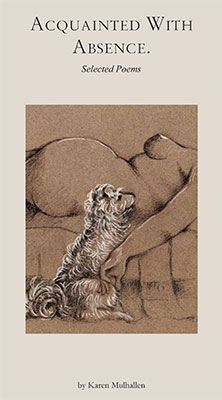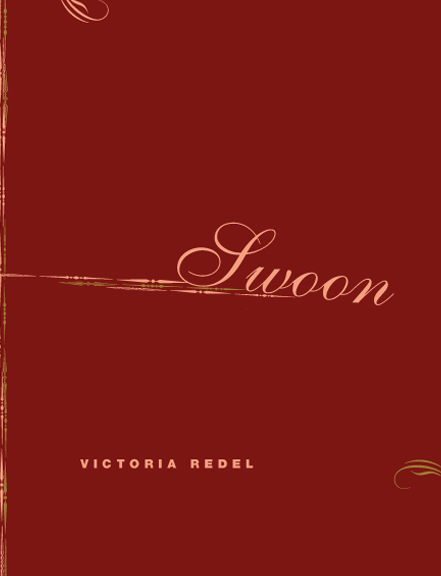

This is my introduction to Karen Mulhallen’s book of selected poems Acquainted With Absence, published last year by Blaurock Press in Canada. I selected the poems, did some editing and wrote this introduction.
dg
/
This isn’t a book, it’s a keen and a lament. It’s words shimmering over the void. It’s whistling in the dark. It’s lusty, lorn, fearful, lonely, melancholy, defiant, ebullient, mischievous, loopy, solemn, comic, mysterious, fragile, erudite, and grand. In “Letter V” (from In the Era of Acid Rain, 1993), the poet addresses an interlocutor: “You complain of my limited subject matter. Death, you say, it’s always death. Let’s hope we can keep up the supply of men, to fuel your ruminations.” To which the poet replies: “But, my dear, you are mistaken. It is not death but union, mating, bridgeworks, which is my subject. Yin and Yang. The severing of bridgeworks, my lament.”
Love and death, then are the subjects, and they are the same, for love implies loss, and death reminds us always of the living thing that was before and the two together are located at the limits of language where each word suggests its opposite and together they create diapasons of wholeness and loss. In the poem “Sheba Oenone” (from Sheba and Solomon, 1984) from which the title of this book is taken, Sheba addresses Solomon after returning to her desert kingdom.
The chronicler warned me
Of the return from your kingdom
Too long you will remain, she said,
After dark is dangerous.
She has remained too long in Israel, the lover’s realm, and, home now, she addresses him as if from the Land of the Dead in a series of paradoxes interspersed with the physical signs of arousal. So that love, loss and desire form a triumvirate of modalities defining the poet’s impossible state.
When it is damp, the water sinks
Eyes flicker
When it is dry, the fountain sprays
Veins pulse
When it is sunning, the prisms crack
Core throbs
When it is darkling, the stars shine
I am waiting.
Acquainted With Absence is about longing for the mysterious one, the fatal flawed lover, it is about travel–the poet goes away and writes back, the lovers call from far away or visit and disappear or hover just beyond reach–it is about the deaths of loved ones, a litany of loss with which we are all, yes, familiar, though for each of us the litany is different. That first book Sheba and Solomon seems now so significant, though it’s early and a kind of trailing harbinger–much later the books come faster–but it’s about a pair of legendary lovers whose courtly affairs mixed with affairs of state seem to belie the passion and eros that inspire the poems. Impossible loves are the only kind, it seems, in Karen Mulhallen’s poems, yet in Sheba’s realm eros has a bite, and an impishly libidinal smile hangs over heart and bier.
These are poems culled from each of the poet’s books, also some are uncollected, and one is unpublished till now. The result is a Frankenstein if we assume that the author’s intent was to create a separate living organic whole with each collection. A very elegant and original Frankenstein, to be sure, a Rudolf Nureyev of a Frankenstein, though no less the child of a radical surgery. I have put the arms and legs from one book with the heart and ears of another. The things I have left out haunt this collection and me. There is a rough narrative arc that is only notionally chronological (the author has had a notable life–Woodstock childhood, Blake scholarship, academic career at Ryerson University, more than thirty years of fostering the country’s writers with Descant Magazine, marriage and aftermath, romances, periods of creative sequestration, fierce, loyal friendships, wanderings, and, always, the writing). But I start with a poem from the author’s first collection and try to dance through marriage, lovers, family deaths and deaths of friends, and travels, vectoring toward that moment when she herself perished, technically, at least, in a diving accident and then came back. (Examining her afterwards in Toronto, doctors discovered her skull to be populated with several mysterious and charmingly named UBOs, Unidentified Bright Objects.)
Ripped from their settings and reordered intuitively (my intuition) the poems now hint at an autobiography that is not Karen Mulhallen’s autobiography but somehow recollects her emotional passage, her obsessions and the idiosyncrasies of an original and remarkable mind. Reading and rereading her, one begins to notice, beyond the narratives of love and death and the concrete references to loved ones and beloved places (ripped from context, the loved ones and beloved places become mysterious and mythic–the lover is a Demon Lover and the earth is Gaia, fecund, damp, sensual), insistent recurrences: water, islands, plant lore, horses, seahorses, even dogs–lovely to watch the imagery unfold into myth, comedy, eros and personal anguish.
Bear with me. An aside on horses. Watch the web and reiteration of words:
Each day on the beach the horses appear.
There are four of them, and a man.
Horses came with the dawn, hyracotherium,
and the dawn horse was small,
only four hands tall from withers to ground…
This is from “The Horses of the Dawn” (from Sea Light, 2003) in which the poet observes four Arabian horses on a Caribbean beach and her mind casts back to the earliest horse (she is always going back to the beginnings of things and tracking the eons forward). And it speaks to a parallel moment on the Toronto Islands in a gorgeous blank verse piece “The Changing Light at Gibraltar Point” (also from Sea Light):
The horses appear at the verge, closer to the studio window than to lake. The light is
strong, the lake is blue, cirrus clouds at horizon, beyond them a pale blue lofty sky. The
black raises its head…
And then, with a modulation of tone (the horse, by the logic of poetic structures, metamorphoses into sea horse, sea monster, part of the brain and a lover’s penis), to this poem “The Sea Horse” (from the book Sea Horses, 2007):
The Sea Horse
preoccupies me
its sweet curve at the edge of the crook of your loins and your thigh
enfolded like the hippocampus, a sea monster/
sea horse, no need to lift up to aggression,
so easily it can be asked to dance;
in repose it is simply at rest,
and age carries that tranquility
in its most sweet form
In Acquainted With Absence, the horse-sea horse-penis brings to mind flutes (for obvious reasons) and iguanas (which, the poet reminds us, have two penises and can be made into an aphrodisiac soup–mentioned twice), but the horse is also death (in a tanka she wrote as part of a multi-year back-and-forth poetic collusion with her friend Virgil Burnett–Renga Talk, 2007):
Death’s the grand stallion
leading us, not to finis,
but to ever, anon–
And at the end of the book it becomes the poet herself.
Wind
on the grass/
my fingers on these keys.
I have come to the place where what I desire
is not what others desire.
I have not yet reached the place where I know this instinctively,
but it is now part of my deep knowledge of myself
And of my relation to the world.
Some Sable Island horses do not drink from the freshwater ponds.
They dig their own holes for their water.
The title of this poem is “Wind” (from Sea Horses) which resonates with an earlier poem called “Winds” (from Sea Light) in which the poet touches on horses and horse latitudes, the verb “horsed” (to be placed in irons), horsing around and horseshoes, but the tone, the somber sublunary self-consciousness, recalls this tanka.
I wonder if I
am lonely, living as I
do. What do you think?
Is it wrong to be alone
always? Is solitude a vice.
For which there is an answer:
You’re right, of course, what’s
needed now is pleasure, of
almost any kind–love,
travel, friends, poetry, sun,
food, art, beauty, music, wine.
I indulge myself in following the horse motif (and there is more to it than I have mentioned) not because I think horses mean anything in the way of a hefty symbol but because with any good book of poems you can take a thread and begin to untangle the skein and it will lead you everywhere else in the book. Who can tell the deepest leanings of the poet’s mind, or would want to, except to say there is joy in metaphor, metamorphosis (a kind of pun, really) and the play of language? “Horse” is a word, and in the end the horses lead us back to the solitary poet and her Mediterranean pleasures (Woodstock, after all, is in Canada’s deep south–we are sun-lovers and pleasure-seekers, the whole lot of us), pleasures which, in the style of the book, take on a melancholy air of bravado. In “Dirge of the Polar Bear” (War Surgery, 1996), the poet writes:
I confess I am old:
In particular, this morning,
as I catch myself in the glass of ice and ocean,
as I begin musing, a-musing
on anabasis, the long march,
the eternal return of my alitros,
my rascal.
Pinpricks of light, entire rainbows
on the points of ice, prisms of air
where Socrates leads the dead to judgement
in the Phaedo, enchanted each by his own genius
entering the realm of myth
led by a daimon, the demon of self
our rascal, our genius, guide
into a territory where ghostly ice shrouds rise up
with each gust across the lake.
The poems in this book date from the 1960s to yesterday and the poet went through several stages of development corresponding to allegiances, discoveries and experiments: Charles Olson’s open field writing–that essay “On Projective Verse”, Whitman’s New World long line, William Carlos Williams’ three-line stanza, James Merrill–unlike many Canadian writers, Mulhallen is willing to admit the richness of American writing. But she is just as likely to be thinking of Thomas Wyatt or Yeats or Keats. The Grace of Private Passage (2000), for example, is written with a lot of those Williams three-line stanzas. The Caverns of Ely (1997, 2000) has a Tennyson poem in the back of its mind, but also contains two Michael Drayton poems, a line from a Jean Rhys novel and a passage of Laurence Sterne’s A Sentimental Journey rendered as poetry .
having been in love almost all my life
may I go on so ‘til I die
Sometimes Karen Mulhallen’s poems look like poems and sometimes they look like prose, although the prose look of, say, “Letter V” is illusory–the poem is written in blank verse buried in a somewhat Miltonic long line of iambic pentameter phrases; the lines run although the ear can pick up the line and stanza breaks and the caesuras throughout. Sometimes she explodes her lines with spaces to create open field poetry. Sometimes the ends of lines stand in for punctuation–periods or commas. Sometimes she runs capital letters at the start of each line and sometimes she doesn’t. All these variants have been left as they were despite the occasional incongruity in the current setting because to homogenize them would have insulted the original organic integrity of inspiration and the poet’s delight in self-transformation and growth. And what you find if you read carefully enough is a text in which the vectors of intention, influence, allusion, word-play, context and specificity (of place, time and gesture) criss-cross to form a densely layered and fascinating poetic matrix.
But this is house-keeping, and I really mean for this mysterious book and the passionate intelligence of the poems to carry themselves without explanation or caveat. Karen Mulhallen is a magnificent poet, prolific, protean and deeply, intensely personal. She is a metaphysical poet, concerned with ends and existence, yet she grounds everything in the specific and the concrete. Just to remind you of how this works, here are lines from “The Caverns of Ely” which echo the wind/horse pattern, quote from a Jean Rhys novel, speak of love and the writing of poetry and close with taking down the laundry.
The wind came up strong today, when you were absent–
I wanted to say away, but feared the closure of a rhyme–
I felt the sadness in the wind, so much sadness in the wind,
and thought of sending cards inscribed to all whom I love
‘It is very windy here’,
as I gathered the laundry from the line.
Everything (love, line, word, laundry, poet) hangs in the windy air between I and you, and the space between is absence, a state of being that informs every poem in this book. To be is to be in a relation and to write is to bridge the gap (watch the “bridge” pattern throughout the book). The paradox (the romantic paradox) is that if there were no gap, if love succeeded, there would be no room for poetry. Think of those courtly troubadour poets singing rhymes to their chaste and irreproachable lovers, the mystical she/other who might be a real woman, or God, or an occasion for a line. Then mull the implications of this elegant turn at the end of the brilliant “Spel Against the Author of Spel Against Love Poems” (from Modern Love, 1990) wherein the poet evades the lover in order to make the writing of love poems possible.
So I write this spel against the speller
I keep silent
evade you here in the light
where my mind is
and not in the body
losing itself to darkness and dreams
to the writing of love poems
I loved you with so bright a light
so wise
I could not write.
—Douglas Glover
/
/
 Herewith the opening lines of new story just published in Ninth Letter (Vol 7, No 1; Spring/Summer 2010).
Herewith the opening lines of new story just published in Ninth Letter (Vol 7, No 1; Spring/Summer 2010).


 I recently saw the film adaptation of Disgrace, J.M. Coetzee’s 1999 Booker Prize winning novel. In the novel, David Lurie is a white college professor in post-apartheid South Africa who has an affair with one of his students, a girl named Melanie Issacs. Melanie files a complaint against Lurie and he is dismissed from his post. He travels to the country to live with his daughter, Lucy, a young woman trying make her way as a farmer. At the farm, Lurie and his daughter are attacked by three black South Africans, foregrounding the huge issues of race and land ownership and post-colonial Africa. Lucy steadfastly refuses to leave the farm, even though her attackers continue to roam nearby. David begins a healing process himself by helping to euthanize stray dogs in a make-shift animal clinic.
I recently saw the film adaptation of Disgrace, J.M. Coetzee’s 1999 Booker Prize winning novel. In the novel, David Lurie is a white college professor in post-apartheid South Africa who has an affair with one of his students, a girl named Melanie Issacs. Melanie files a complaint against Lurie and he is dismissed from his post. He travels to the country to live with his daughter, Lucy, a young woman trying make her way as a farmer. At the farm, Lurie and his daughter are attacked by three black South Africans, foregrounding the huge issues of race and land ownership and post-colonial Africa. Lucy steadfastly refuses to leave the farm, even though her attackers continue to roam nearby. David begins a healing process himself by helping to euthanize stray dogs in a make-shift animal clinic.

















